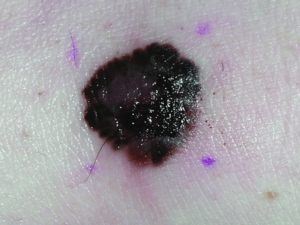Discovering a suspicious spot on your face can be worrying, but understanding the facts is the first step towards peace of mind and effective treatment.
Why the Face Is a High-Risk Area
Skin cancer most often develops in areas exposed to the sun, and the face—including the nose, cheeks, forehead, lips, and ears—is especially vulnerable. Basal cell carcinoma (BCC) and squamous cell carcinoma (SCC) are the most common types found on the face, but melanoma can also occur here.
Warning Signs and Symptoms
Skin cancers on the face can appear in many forms and may be mistaken for harmless blemishes or persistent sores. Key signs to watch for include:
- A new, expanding, or changing growth spot or bump
- A sore that bleeds, crusts, or doesn’t heal after several weeks
- A rough or scaly red patch, sometimes with crusting or bleeding
- A shiny, pearly, or translucent bump—often pink, red, or skin-coloured
- A flat, firm, pale, or yellow area, similar to a scar
- Wart-like growths
- A mole or freckle that changes in size, shape, or colour, or has irregular borders
Note: On the face, even small changes can be significant due to the area’s high visibility and delicate structures.
Types of Skin Cancer Found on the Face
|
Type |
Typical Appearance on Face |
Notes |
|
Basal Cell Carcinoma (BCC) |
Shiny or pearly bump, pink growth with raised edge, open sore |
Most common, slow-growing, rarely spreads |
|
Squamous Cell Carcinoma |
Rough, scaly patch, raised lump, open sore, wart-like growth |
Can be more aggressive, especially on lips/ears |
|
Melanoma |
New or changing mole, irregular shape/colour, “ugly duckling” lesion |
Least common, most dangerous if not caught early |
Diagnosis and When to See a Dermatologist
If you notice any suspicious spots or sores on your face that don’t heal, change, or look unusual, see a dermatologist promptly for evaluation. Early diagnosis is key to successful treatment and minimising scarring.
Treatment Options for Facial Skin Cancer
Treatment is tailored to the type, size, and location of the cancer. Common options include:
- Mohs Surgery: Gold standard for facial skin cancers; removes cancer layer by layer, sparing healthy tissue and minimising scarring.
- Excisional Surgery: Removal of the tumour and some surrounding tissue.
- Cryosurgery: Freezing the cancer cells, used for small/superficial lesions.
- Laser Surgery: Sometimes used for superficial cancers.
- Photodynamic Therapy (PDT): Light-activated treatment for some superficial cancers.
- Topical Medications: Creams or gels for certain superficial cancers.
- Radiation Therapy: Sometimes used when surgery isn’t possible.
A dermatologist will recommend the best approach based on the diagnosis and cosmetic considerations.
Prevention and Self-Examination
- Protect your face from sun exposure: Use broad-spectrum SPF 30+ sunscreen, wear hats, and seek shade.
- Avoid tanning beds.
- Perform regular self-exams: Look for new or changing spots, especially on the face, ears, and lips.
- See a dermatologist for annual skin checks or if you notice anything suspicious.
Meet the Team at The Skin Care Network
At The Skin Care Network, our expert dermatology team is dedicated to providing exceptional care for facial skin cancer and other complex skin conditions. Our specialists work collaboratively to deliver personalised, patient-centred treatment plans tailored to your unique needs.
We combine advanced diagnostic techniques with the latest surgical and non-surgical treatments to achieve the best possible outcomes while minimising scarring and preserving facial aesthetics. With extensive experience managing delicate cases, our team is committed to early detection, accurate diagnosis, and compassionate care to support you throughout your skin health journey.
Take Control of Your Health and Gain Peace of Mind
Protect your health and peace of mind—early detection is the key to the best outcomes for skin cancer on the face.
Book a comprehensive facial skin cancer screening with Teena and our specialist team at The Skin Care Network.
Call us on 02084411043 or click the Make An Appointment button below to schedule your consultation.
Our dermatology team includes leading experts:
- Dr. Hilmi – Consultant Dermatologist specialising in skin cancer and complex dermatological conditions.
- Dr. Aaron Hughes – Consultant Dermatologist with expertise in dermatological surgery and advanced skin cancer treatments.
- Teena – Specialist dermatologist committed to personalised patient care and early detection of skin cancer.
Frequently Asked Questions About Skin Cancer on the Face
Understanding skin cancer on the face is crucial for early detection and effective treatment. This FAQ section addresses common concerns about symptoms, diagnosis, treatment options, and prevention to help you make informed decisions about your skin health. If you have additional questions, our expert team is here to assist you.
What are the common signs of skin cancer on the face?
Common signs include new or changing growths, sores that do not heal, pearly or translucent bumps, rough or scaly patches, and moles or freckles that change in size, shape, or colour. Any unusual or persistent lesion should be evaluated by a dermatologist.
Which types of skin cancer are most common on the face?
Basal cell carcinoma and squamous cell carcinoma are the most frequent types on the face, followed by melanoma, which is less common but more serious.
How is facial skin cancer diagnosed?
Diagnosis typically involves a thorough clinical examination, dermoscopy, and sometimes a skin biopsy to confirm the type and extent of cancer.
What treatment options are available for skin cancer on the face?
Treatments range from surgical options like Mohs surgery and excisional surgery to non-surgical methods such as cryotherapy, photodynamic therapy, topical medications, and radiation therapy, depending on the cancer type and location.
Can skin cancer on the face be prevented?
While not all cases are preventable, protecting your skin from UV exposure with sunscreen, hats, and avoiding tanning beds significantly reduces risk. Regular self-exams and professional screenings are also vital.
When should I see a dermatologist for a skin check?
If you notice any new, changing, or suspicious spots on your face or elsewhere, or if you have risk factors like fair skin or a family history of skin cancer, schedule a professional skin check promptly.



